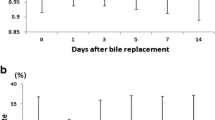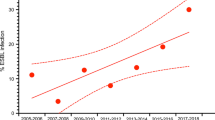Abstract
This study aimed at evaluating whether the administration of symbiotic therapy in jaundiced patients could reduce their postoperative infectious complications. The study was conducted between November 2008 and February 2011. Jaundiced patients scheduled for elective extrahepatic bile duct resection without liver cirrhosis, intestinal malabsorption or intolerance to symbiotic therapy were randomly assigned to receive [Group A] or not [Group B] symbiotics perioperatively. The primary endpoint was the infectious morbidity rate. Forty patients were included in the analysis (20 in each group). The patients in Group B presented a higher overall morbidity (70 vs 50 %) and infectious morbidity rate (50 vs 25 %), but the differences were not significant. Eleven patients in Group A (Group ndA) and 13 in Group B (Group ndB) did not receive preoperative biliary drainage. The results of the two groups were comparable. Infectious complications were higher in Group B [5 (34 %) vs 0, p = 0.030], while the prevalence of natural killer (NK) cells was higher in Group ndA the day before surgery (17 % ± 5.1 vs 10 % ± 5.3, p < 0.01) and on post-operative day (POD) 7 (13.1 % ± 4.1 vs 7.7 % ± 3.4, p < 0.01). The rates of lymph node colonization were similar. The symbiotic therapy failed to reduce the rate of infectious morbidity in jaundiced patients. Further studies investigating the place of symbiotic in no-drainage patients are required.


Similar content being viewed by others
References
Lai EC, Chu KM, Lo CY, Mok FP, Fan ST, Lo CM et al (1992) Surgery for malignant obstructive jaundice: analysis of mortality. Surgery 112:891–896
Su CH, P’eng FK, Lui WY (1992) Factors affecting morbidity and mortality in biliary tract surgery. World J Surg 16:536–540
Greig JD, Krukowski ZH, Matheson NA (1998) Surgical morbidity and mortality in one hundred and twenty-nine patients with obstructive jaundice. Br J Surg 75:216–219
Pain JA, Cahill CJ, Bailey ME (1985) Perioperative complications in obstructive jaundice: therapeutic considerations. Br J Surg 72:942–945
Sewnath ME, Karsten TM, Prins MH, Rauws EJ, Obertop H, Gouma DJ (2002) A meta-analysis on the efficacy of preoperative biliary drainage for tumors causing obstructive jaundice. Ann Surg 236:17–27
Assimakopoulos SF, Scopa CD, Zervoudakis G, Mylonas PG, Georgiou C, Nikolopoulou V (2005) Bombesin and neurotensin reduce endotoxemia, intestinal oxidative stress, and apoptosis in experimental obstructive jaundice. Ann Surg 241:159–167
Jin LZ, Ho YW, Abdullah N, Jalaludin S (2000) Digestive and bacterial enzyme activities in broilers fed diets supplemented with Lactobacillus cultures. Poult Sci 79:886–891
Erickson KE, Hubbard NE (2000) Probiotic immunomodulation in health and disease. Am Soc Nutr Sc 2000(130):403S–409S
Assimakopoulos SF, Vagianos CE, Patsoukis N, Georgiou C, Nikolopoulou V, Scopa CD (2004) Evidence for intestinal oxidative stress in obstructive jaundice-induced gut barrier dysfunction in rats. Acta Physiol Scand 180:177–185
Ogata Y, Nishi M, Nakayama H, Kuwahara T, Ohnishi Y, Tashiro S (2003) Role of bile in intestinal barrier function and its inhibitory effect on bacterial translocation in obstructive jaundice in rats. J Surg Res 115:18–23
Greig JD, Krukowski ZH, Matheson NA (1988) Surgical morbidity and mortality in one hundred and twenty-nine patients with obstructive jaundice. Br J Surg 75:216–219
Clements WD, Parks R, Erwin P, Halliday MI, Barr J, Rowlands BJ (1996) Role of the gut in the pathophysiology of extrahepatic biliary obstruction. Gut 39:587–593
Yang R, Harada T, Li J, Uchiyama T, Han Y, Englert JA, Fink MP (2005) Bile modulates intestinal epithelial barrier function via an extracellular signal related kinase 1/2 dependent mechanism. Intensive Care Med 31:709–717
Assimakopoulos SF, Vagianos CE (2007) Pathophysiology of increased intestinal permeability in obstructive jaundice. World J Gastroenterol 13:6458–6464
Gratz SW, Mykkanen H, El-Nezami HS (2010) Probiotics and gut health: a special focus on liver diseases. World J Gastroenterol 6:403–410
Albers R, Antoine JM, Bourdet-Sicard R, Calder PC, Gleeson M, Lesourd B (2005) Markers to measure immunomodulation in human nutrition intervention studies. Br J Nutr 94:452–455
Madsen K, Cornish A, Soper P, McKaigney C, Jijon H, Yachimec C, Doyle J, Jewell L, De Simone C (2001) Probiotic bacteria enhance murine and human intestinal epithelial barrier function. Gastroenterology 121:580–591
Li Z, Yang S, Lin H, Huang J, Watkins PA, Abet Moser (2003) Probiotics and antibodies to TNF inhibit inflammatory activity and improve nonalcoholic fatty liver disease. Hepatology 37:343–350
Dindo D, Demartines N, Clavien PA (2004) Classification of surgical complications: a new proposal with evaluation in a cohort of 6336 patients and results of a survey. Ann Surg 240:205–513
American College of Chest Physicians/Society of Critical Care (1992) Medicine Consensus Conference: definitions for sepsis and organ failure and guidelines for the use of innovative therapies in sepsis. Crit Care Med 20:864–874
Shigeta H, Nagino M, Kamiya J, Uesaka K, Sano T, Yamamoto H (2002) Bacteremia after hepatectomy: an analysis of a single-center, 10-year experience with 407 patients. Langenbecks Arch Surg 387:117–124
Rayes N, Seehofer D, Neuhaus P (2009) Prebiotics, probiotics, synbiotics in surgery-are they only trendy, truly effective or even dangerous? Langenbecks Arch Surg 394:547–555
Kanazawa H, Nagino M, Kamiya S, Komatsu S, Mayumi T, Takagi K (2005) Synbiotics reduce postoperative infectious complications: a randomized controlled trial in biliary cancer patients undergoing hepatectomy. Langenbecks Arch Surg 390:104–113
Sugawara G, Nagino M, Nishio H, Ebata T, Takagi K, Asahara T, Nomoto K, Nimura Y (2006) Perioperative synbiotic treatment to prevent postoperative infectious complications in biliary cancer surgery: a randomized control trial. Ann Surg 5:706–714
Kamiya S, Nagino M, Kanazawa H, Komatsu S, Mayumi T, Takagi K, Asahara T, Nomoto K, Tanaka R, Nimura Y (2004) The value of bile replacement during external biliary drainage: an analysis of intestinal permeability, integrity, and microflora. Ann Surg 239:510–517
Kinross J, Warren O, Silk D, Darzi A (2007) Perioperative synbiotic treatment to prevent postoperative infectious complications in biliary cancer surgery: a randomized control trial. Ann Surg 245:1000
Gionotti L, Alexander JW, Nelson JL (1994) Role of early enteral feeding and acute starvation on post burn bacterial translocation and host defense: prospective, randomized trials. Crit Care Med 22:265–272
Kudsk KA, Croce MA, Fabian TC, Minard G, Tolley EA, Poret HA (1992) Enteral versus parenteral feeding: effects on septic morbidity after blunt and penetrating abdominal trauma. Ann Surg 215:503–513
Petrov MS, Loveday BP, Pylypchuk RD, McIlroy K, Phillips AR, Windsor JA (2009) Systematic review and meta-analysis of enteral nutrition formulations in acute pancreatitis. Br J Surg 96:1243–1252
Petrov MS, van Santvoort HC, Besselink MG, van der Heijden GJ, Windsor JA, Gooszen HG (2008) Enteral nutrition and the risk of mortality and infectious complications in patients with severe acute pancreatitis: a meta-analysis of randomized trials. Arch Surg 143:1111–1117
Ishizawa T, Hasegawa K, Sano K, Imamura H, Kokudo N, Makuuchi M (2007) Selective versus total biliary drainage for obstructive jaundice caused by a hepatobiliary malignancy. Am J Surg 193:149–154
Povoski SP, Karpeh MS Jr, Conlon KC, Blumgart LH, Brennan MF (1999) Association of preoperative biliary stenting with increased postoperative infectious complications in proximal cholangiocarcinoma. Arch Surg 134:261–266
Ferrero A, Lo Tesoriere R, Viganò L, Caggiano L, Sgotto E, Capussotti L (2009) Preoperative biliary drainage increases infectious complications after hepatectomy for proximal bile duct tumor obstruction. World J Surg 33:318–325
O’Boyle CJ, MacFie J, Mitchell CJ, Johnstone D, Sagar PM, Sedman PC (1998) Microbiology of bacterial translocation in humans. Gut 42:29–35
MacFie J, Reddy BS, Gatt M, Jain PK, Sowdi R, Mitchell CJ (2006) Bacterial translocation studied in 927 patients over 13 years. Br J Surg 93:87–93
MacFie J, O’Boyle CJ, Mitchell CJ, Buckley PM, Johnstone D, Sudworth P (1999) Gut origin of sepsis: a prospective study investigating associations between bacterial translocation, gastric microflora, and septic morbidity. Gut 45:223–228
Albers R, Antoine JM, Bourdet-Sicard R, Calder PC, Gleeson M, Lesourd B, Samartín S, Sanderson IR, Van Loo J, Vas Dias FW, Watzl B (2005) Markers to measure immunomodulation in human nutrition intervention studies. Br J Nutr 94:452–481
Anderson AD, McNaught CE, Jain PK, MacFie J (2004) Randomised clinical trial of synbiotic therapy in elective surgical patients. Gut 53:241–245
Westrate JA, Van Poppel G, Verschuren PM (2002) Functional foods, trends and future. Br J Nutr 88:S233–S235
Acknowledgments
The authors are grateful to nursing staff who participated in the study, especially to Mr. Antonio Valenti for his help.
Conflict of interest
The authors declare that they have no conflict of interest.
Author information
Authors and Affiliations
Corresponding author
Rights and permissions
About this article
Cite this article
Russolillo, N., Ferrero, A., Vigano’, L. et al. Impact of perioperative symbiotic therapy on infectious morbidity after Hpb Surgery in jaundiced patients: a randomized controlled trial. Updates Surg 66, 203–210 (2014). https://doi.org/10.1007/s13304-014-0259-y
Received:
Accepted:
Published:
Issue Date:
DOI: https://doi.org/10.1007/s13304-014-0259-y




